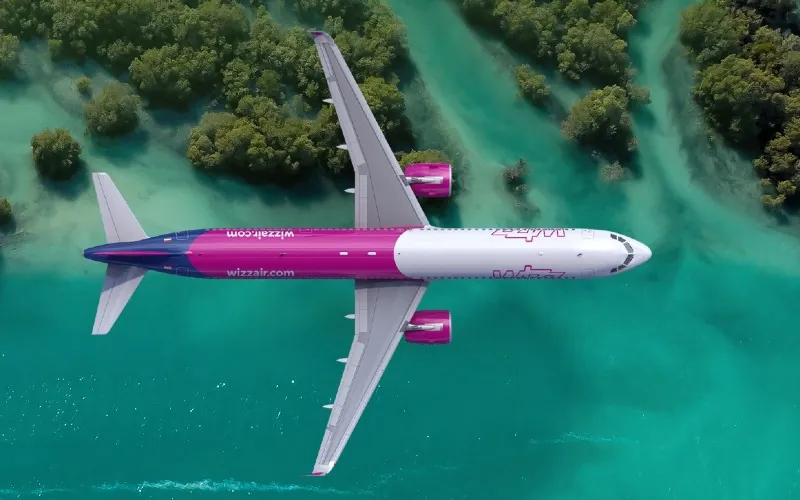The European low-cost airline Wizz Air has made it their mission to make navigating the skies a smoother experience. But like any journey, it sometimes encounters turbulence in the frustrating form of delays, cancellations, and overbookings.
If any airline wants to compete with the big guns, it needs compensation policies that serve its passengers better. In response, Wizz Air has continually redefined and evolved how it deals with flight disruptions.
We’re delving deeper into the history of Wizz Air, the evolution of their policies, and how they stand up against other major players in the industry.
Let’s start with a background check.
Background of Wizz Air
Wizz Air burst onto the scene back in 2003, emerging as a significant player in the European low-cost airline market.
Standing out from the over-saturated crowd, Wizz Air’s rapid expansion and new routes across Europe and beyond made it a popular choice for budget-conscious travelers. Keeping its focus on cost-efficiency, this family-friendly airline has been right at the forefront of providing affordable travel options to its passengers. All done while navigating the complexities of the airline industry’s famously challenging operations.
Wizz Air’s Initial Compensation Policies
Every airline worth its salt needs robust compensation policies in case of flight disruptions and delays.
In its early years, Wizz Air’s approach to compensation for flight disruptions was pretty standard. In fact, it mirrored many other airlines and historical industry norms.
Passengers facing cancellations or delays could expect the following:
- Rebooking on subsequent available fights.
- Refunds, Wizz account credits, or travel vouchers as compensation.
- Limited access to basic amenities during extended delays.
These compensation steps depended on time since the flights were scheduled to depart, much like other standard compensation policies. But more in-depth or specific information on compensation for delays or overbooking isn’t readily available.
These measures were foundational and indicative of the industry as a whole, but more often than not, they didn’t go far enough. The policies often only partially addressed passengers’ wide range of inconveniences – particularly for people missing crucial life events like business meetings or family gatherings.
Key Changes and Evolution Over Time
After recognizing there needed to be a change that increased customer satisfaction, Wizz Air began completely overhauling its compensation policies.
While the marked passenger dissatisfaction was one driving force for change, the shift was also driven by the implementation of the EU’s air passenger rights regulation (EC 261/2004). This regulation compelled airlines to offer much better and fairer compensation coverage for delays, cancellations, and overbooking.
This modification led to some really significant changes, including:
- Increased financial compensation for delays over three hours, aligning with EU standards.
- Improved handling of overbooking situations, offering better incentives for passengers voluntarily giving up their seats.
- A more streamlined and user-friendly process for passengers to lodge a Wizz Air compensation claim, enhancing the overall customer experience.
These changes marked a significant evolution towards a more passenger-centric approach in Wizz Air’s operations. But it hasn’t all been smooth sailing for the airline since implementation.
Wizz Air faced criticism and a demand for enforcement changes for its handling of compensation claims in reports from Business Traveler USA and the UK’s Civil Aviation Authority (CAA). They said the low-cost airline had been mandated to review outstanding claims and improve customer service.
Wizz Air’s Current Compensation Policies
Today, Wizz Air’s compensation policies tell a tale of transformation.
After criticism and constant policy evolution, the current procedures stand as a testament to its move toward prioritizing passenger convenience above all.
These policies include:
- Quick financial compensation for significant delays, cancellations, and denied boarding.
- Flexible options for passengers, including rebooking or receiving a Wizzair refund for disrupted flights.
- Extended support services, like accommodation and meals, during long delays.
These updated guidelines adhere to regulations to the letter. And even demonstrate Wizz Air’s commitment to going above and beyond.
Comparison with Other Airlines
But how does Wizz Air stand up against the competition?
Well, in the world of low-cost carriers, these compensation policies really stand out from the crowd. While most airlines offer similar compensatory measures, Wizz Air emphasizes more efficient claim processing and procedure transparency. And their approach hasn’t just improved customer relations; it’s also raised the bar for service standards across the industry.
In conclusion
The evolution of Wizz Air’s compensation policies is massive. They reflect their commitment to passenger satisfaction and continued development in response to an ever-changing travel landscape.
The policy enhancements, particularly the Wizzair refund and compensation process, highlight the airline’s dedication to turning negative travel experiences into positive ones.


